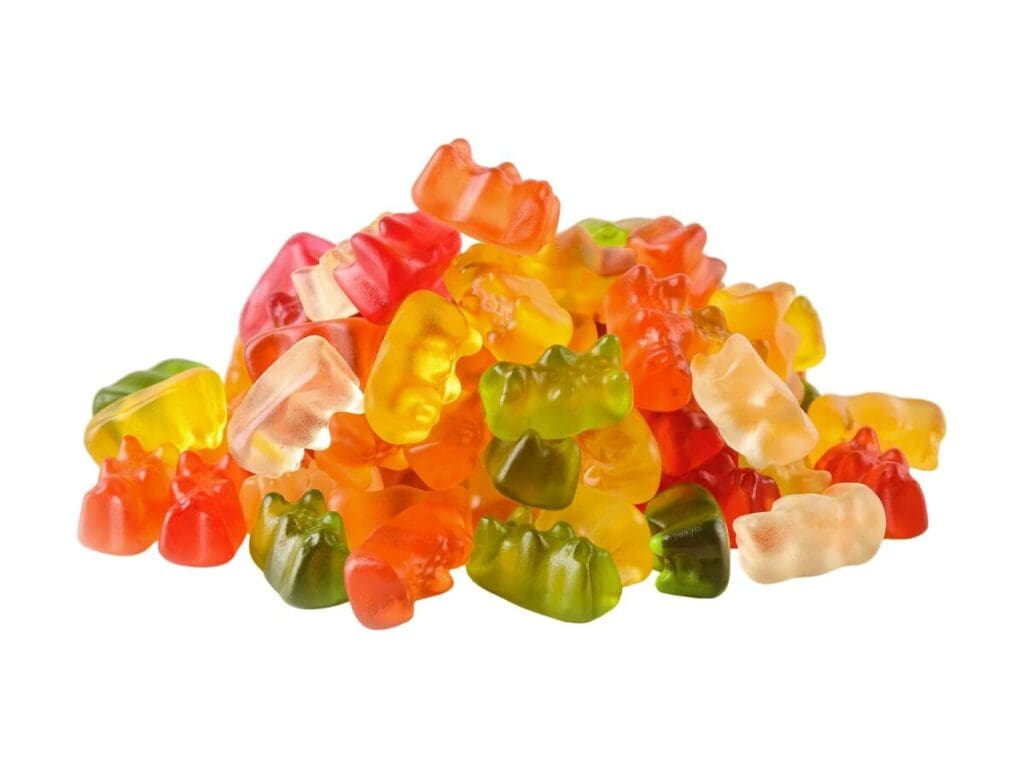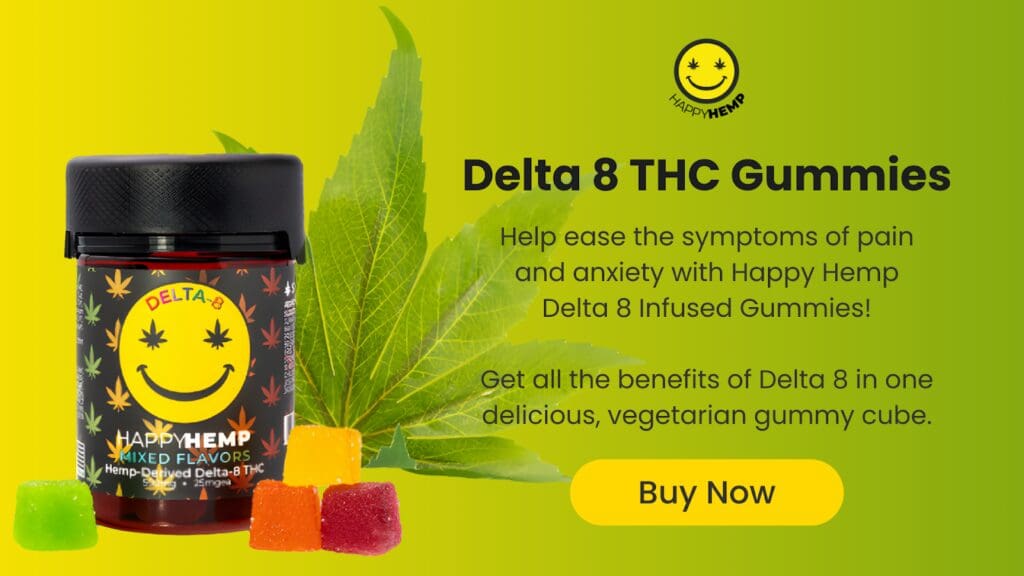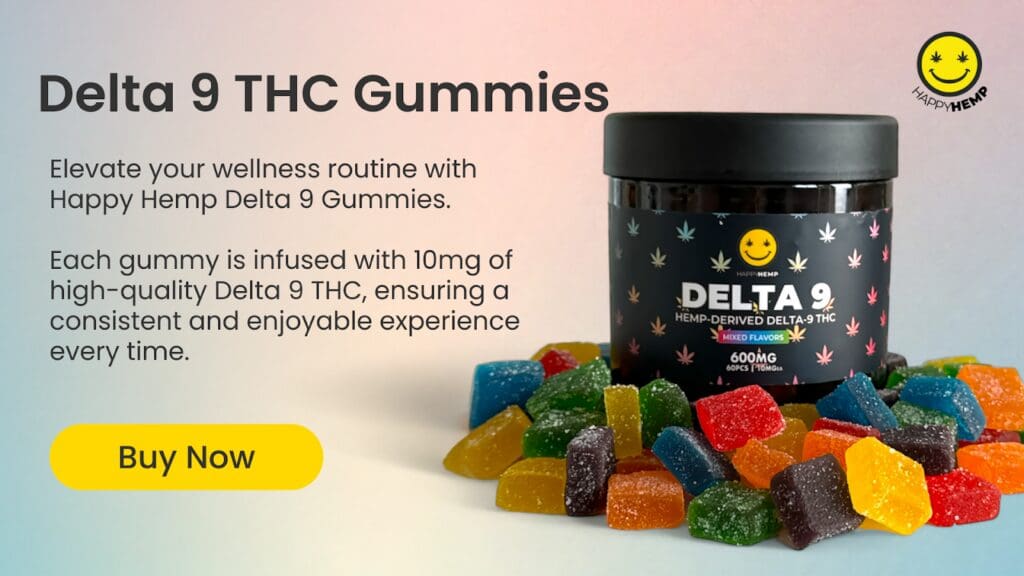Key Takeaways:
- Potency and Effects: Understand how Delta 8 and Delta 9 differ in intensity and their unique experiences.
- Legal and Accessibility Differences: Learn where each type of gummy is legally available and accessible.
- Choosing Based on Needs: Discover which option might best suit beginners versus experienced THC users.
Ever wondered what sets Delta 8 gummies apart from Delta 9? Choosing between these two THC options can be a bit like choosing between coffee and tea—they both offer benefits, but their effects differ significantly. At Happy Hemp, we’re not just providing products; we’re pioneering a premium, trustworthy THC experience. With rigorous third-party testing, sustainable sourcing, and eco-friendly packaging, Happy Hemp stands at the forefront of high-quality, dependable Delta 8 and Delta 9 products.
In this guide, we’ll help you understand which gummy best fits your wellness journey.
What Are Delta 8 Gummies?
Delta 8 gummies are edible treats infused with Delta 8 THC, a naturally occurring cannabinoid found in hemp and cannabis plants, though typically in much smaller quantities compared to Delta 9 THC. Delta 8 is chemically similar to Delta 9 but has a slightly different molecular structure, which contributes to its milder psychoactive effects.
These gummies offer a way for users to enjoy a subtle, calming high without the intensity often associated with traditional THC (Delta 9). People who prefer a less potent experience often choose Delta 8 for its more balanced and gentle effects. Additionally, since Delta 8 is derived from hemp, it is often more widely available and legal in certain regions compared to Delta 9, making it an accessible option for many.
Explore the best of both worlds with Happy Hemp’s Delta 8 and Delta 9 gummies! Whether you’re seeking a mild, balanced high or a more intense experience, our carefully crafted gummies provide the perfect choice. Visit our collections and find the ideal fit for your wellness journey:
What Are Delta 9 Gummies?
Delta 9 gummies are edibles infused with Delta 9 THC, the primary psychoactive compound found in cannabis that is responsible for the traditional “high” associated with marijuana. Delta 9 THC is more potent than Delta 8, offering a more intense psychoactive experience, which can vary in duration and strength based on individual tolerance and dosage.
Because Delta 9 is more abundant in cannabis plants, it is typically easier to extract and is the form of THC most people are familiar with. Users often choose Delta 9 gummies for recreational purposes, as well as for therapeutic uses like pain relief, appetite stimulation, and relaxation. However, due to its potency, Delta 9 THC can sometimes cause stronger side effects, such as anxiety or paranoia, especially in high doses or for those sensitive to THC.
Comparing The Effects: Delta 8 Vs Delta 9
The effects of Delta 8 and Delta 9 THC differ primarily in terms of intensity and overall experience. While both interact with the body’s endocannabinoid system to produce a high, Delta 8 is generally considered less potent and produces a more controlled, calming effect. Here’s a closer look at how each impacts the user:
Delta 8 Effects
Known for a smoother, more relaxed high, Delta 8 THC tends to produce effects that are less intense than Delta 9. Many users report a gentle euphoria, clearer mental state, and mild relaxation without the risk of feeling overwhelmed. This makes Delta 8 a preferred choice for those new to THC or for users seeking a functional high that allows them to maintain focus and productivity.
Delta 9 Effects
Delta 9 THC, on the other hand, is more potent and can produce a much stronger psychoactive experience. The high from Delta 9 is typically more intense, often accompanied by euphoria, heightened sensory perception, and deeper relaxation. However, it can also lead to side effects like paranoia, anxiety, or increased heart rate in some users, especially at higher doses.
Potential Benefits Of Delta 8 Gummies
Delta 8 gummies offer a range of potential benefits, appealing to users looking for a gentler experience with THC. Here are some key advantages:
- Calming and Anxiety-Relieving Effects: Delta 8 THC is known for providing a relaxing and calming effect without the intensity of Delta 9. Many users report that Delta 8 helps reduce anxiety, providing a sense of calm without the high risk of paranoia or overwhelming sensations.
- Mild Pain Relief: Delta 8 may offer mild pain-relieving properties, making it a popular option for those with chronic pain, inflammation, or discomfort who want a subtle, manageable form of relief.
- Increased Focus and Clarity: Unlike Delta 9, which can sometimes lead to a cloudy or intense high, Delta 8 is often described as providing a clearer mental state. Users find they can stay productive and focused while enjoying a mild euphoria, which is helpful for daytime use.
- Appetite Stimulation: Similar to Delta 9, Delta 8 also has appetite-stimulating properties, often referred to as the “munchies.” For individuals needing assistance with appetite, Delta 8 can be a valuable aid without the potent high associated with Delta 9.
These benefits make Delta 8 gummies an appealing choice for users who want to experience THC’s therapeutic effects without diving into the stronger psychoactivity of Delta 9.
Potential Benefits Of Delta 9 Gummies
Delta 9 gummies offer a stronger THC experience, which can be beneficial for users seeking more pronounced effects. Here are some potential benefits:
- Intense Relaxation and Euphoria: Delta 9 THC is known for its ability to create a deep sense of relaxation and a more intense euphoria. Many users enjoy this for unwinding after a long day or enhancing recreational experiences.
- Pain Relief: Delta 9 is often chosen for its stronger analgesic properties. It is frequently used by individuals with chronic pain, inflammation, or post-surgical discomfort who need a more substantial level of relief than what Delta 8 might offer.
- Enhanced Sensory Perception: Many people report heightened sensory experiences with Delta 9, which can be enjoyable for listening to music, watching movies, or engaging in creative activities. This effect is part of what makes Delta 9 a popular choice for recreational use.
- Nausea and Appetite Stimulation: Delta 9 is commonly used in medical settings to help stimulate appetite and reduce nausea, particularly for individuals undergoing treatments that suppress appetite, such as chemotherapy.
The potent effects of Delta 9 gummies make them a good choice for those who need stronger relief or a more intense experience, though they may not be ideal for everyone, especially new users or those sensitive to THC.
Choosing Between Delta 8 And Delta 9: Factors To Consider
When selecting between Delta 8 and Delta 9 gummies, it’s essential to weigh factors like experience level, desired effects, legal restrictions, and intended use. Each type of THC offers distinct advantages, appealing to different user goals and tolerance levels. To make an informed choice, consider these key aspects:
Experience Level And THC Sensitivity
For those new to THC or sensitive to its effects, Delta 8 provides a milder and more approachable option. Its effects are less intense, reducing the likelihood of overwhelming side effects that some experience with Delta 9. This makes Delta 8 an ideal starting point for beginners or those cautious about THC’s psychoactive impact.
Desired Effects And Experience
Delta 8 is often preferred by users seeking a calm, balanced high with mild euphoria and relaxation. Its effects are more subdued, promoting a sense of ease without significant psychoactivity. In contrast, Delta 9 is better suited for individuals looking for a stronger, more euphoric experience that may be beneficial for deeper relaxation or stronger therapeutic effects.
Legal Availability And Accessibility
Legal considerations are crucial, as Delta 8 and Delta 9 are regulated differently depending on state laws. Delta 8 is often available in areas with stricter cannabis laws because it is typically classified as a hemp-derived product. However, Delta 9 may only be accessible in states where recreational or medical marijuana use is legalized, affecting product choice based on location.
Purpose Of Use And Therapeutic Benefits
For those interested in mild therapeutic effects such as relaxation or enhanced focus, Delta 8 can be a practical choice that aligns well with daily activities. Alternatively, Delta 9 is favored for purposes requiring stronger effects, such as pain relief, appetite stimulation, or a more intense recreational experience. This distinction allows users to choose a product tailored to their specific wellness or recreational goals.
How To Determine The Right Dosage
Finding the correct dosage for Delta 8 and Delta 9 gummies is key to achieving a safe and enjoyable experience. Since Delta 9 is more potent than Delta 8, dosages vary significantly, especially for beginners. To ensure optimal results, users should consider starting with a low dose, assessing the effects, and gradually adjusting as needed. Several factors influence the ideal dosage, such as tolerance levels, body weight, and metabolism, which we’ll explore in more detail.
Starting Dosages For Beginners
Beginners are encouraged to start with a conservative dose to avoid overwhelming effects. For Delta 8, a starting dosage of 5-10 mg is often sufficient for new users, offering a gentle introduction to its effects. With Delta 9 being more potent, beginners may find a lower range of 2.5-5 mg more appropriate to prevent an overly intense experience.
Adjusting Dosage Gradually
When trying Delta 8 or Delta 9 gummies, it’s crucial to take a gradual approach to dosage adjustment. Users should allow sufficient time—typically 1 to 2 hours—for the effects to fully set in before deciding if an increase is needed. By gradually increasing the dose in small increments, users can find their ideal dosage without risking uncomfortable side effects.
Influence Of Body Weight On Dosage
Body weight can significantly affect how Delta 8 and Delta 9 THC interact with the system, impacting both onset and duration of effects. Those with a lower body weight may feel the effects more intensely at lower doses, while individuals with a higher body weight may require a slightly higher dose to achieve the desired experience. This factor makes it essential to consider personal body composition when selecting the right dosage.
Role Of Metabolism And Tolerance
Metabolism and THC tolerance are important considerations, as they determine how quickly and effectively the body processes THC. Individuals with faster metabolisms may experience shorter effects, requiring a slightly higher or more frequent dose. Meanwhile, those with higher tolerance levels may need an elevated dose of Delta 8 or Delta 9 to achieve noticeable effects, especially if they are experienced THC users.
Listening To Personal Response
Ultimately, the right dosage comes down to listening to one’s body and adjusting based on personal comfort. Each person’s response to Delta 8 and Delta 9 can vary widely, so self-awareness is essential in finding the ideal balance. By starting slow and taking time to understand individual reactions, users can identify the dosage that offers the best combination of comfort and effectiveness.
What To Expect From Delta 8 Vs. Delta 9 Gummies
User experiences with Delta 8 and Delta 9 gummies can differ significantly due to the unique effects each cannabinoid produces. Delta 8 is commonly associated with a smooth, clear-headed high that fosters relaxation without intense psychoactivity, making it ideal for those who want to remain functional. In contrast, Delta 9 provides a more potent and immersive experience, often preferred for its euphoric and sensory-enhancing qualities. Understanding how each affects the mind and body can help users choose the right fit for their needs.
Delta 8: A Balanced, Clear-Headed High
Delta 8 is celebrated for its calming and balanced effects, offering users a high that is often described as mellow and controlled. It provides a sense of mental clarity and gentle euphoria that allows individuals to stay grounded, making it suitable for daytime activities. Users frequently find that Delta 8 allows them to unwind without the risk of feeling mentally clouded, which is beneficial for those who need to remain focused or productive.
Delta 9: An Intense And Euphoric Experience
Delta 9 is known for delivering a stronger psychoactive effect, offering users a high that is more potent and sensory-enhancing. The effects of Delta 9 include pronounced euphoria and heightened perceptions, making it a popular choice for those seeking a recreational experience. Many users turn to Delta 9 when they wish to fully disconnect from stress and immerse themselves in a profound sense of relaxation or joy.
Ideal Situations For Delta 8 Usage
Given its mild effects, Delta 8 is often chosen for situations where calm and relaxation are desired without compromising functionality. Many users find Delta 8 gummies to be an excellent option for managing stress or easing into a more relaxed state while still engaging in activities that require focus. Its clear-headed high makes it versatile, fitting well with tasks or social settings where full cognitive engagement is necessary.
Best Uses For Delta 9 Gummies
Delta 9 is generally preferred for times when users want a deep, immersive experience, often at the end of the day or during recreational activities. Its ability to heighten sensory experiences and induce a powerful state of euphoria can make it ideal for unwinding fully or for enhancing creative pursuits like music, art, or social events. Users who desire a break from routine or wish to explore a more intense THC experience often gravitate toward Delta 9.
Potential Side Effects And Considerations
Delta 8 is typically associated with fewer side effects, which makes it a popular choice for those who may be sensitive to THC’s stronger effects. In contrast, Delta 9 can produce stronger side effects, such as paranoia or increased anxiety, particularly at higher doses. Understanding these differences is crucial for users looking to minimize adverse reactions and enjoy a THC experience tailored to their comfort level.
Final Thoughts
Choosing between Delta 8 and Delta 9 gummies ultimately comes down to your personal goals, tolerance, and experience level. User feedback suggests that Delta 8 provides a manageable high, ideal for newcomers and those seeking daytime relaxation. Delta 9, however, offers a stroger effect, making it a favorite for intense relaxation or recreational use.
To find the best dosage, start with a low amount—5-10 mg for Delta 8 or 2.5-5 mg for Delta 9—then gradually adjust as needed. Remember, each experience is unique, and experimentation helps you find what works best while respecting your tolerance.
Read also:
- How Long Does Delta 8 Stay In Your System?
- Delta 8 THC Flower: What You Need to Know
- Delta 8 for Better Sleep – Discover the Benefits for a Restful Night
Frequently Asked Questions About Delta 8 Vs. Delta 9 Gummies
What are the main differences in flavor between Delta 8 and Delta 9 gummies?
The flavor profiles are usually similar across Delta 8 and Delta 9 gummies, as they both come in fruit and dessert flavors. The difference lies in the effects, not the taste.
Can Delta 8 and Delta 9 gummies be mixed?
Yes, but mixing them may intensify effects. For new users, it’s best to start with one type to gauge individual tolerance before combining.
How long do Delta 8 gummies take to work compared to Delta 9?
Both types typically take 30-60 minutes to kick in, though Delta 9 may produce quicker and more intense effects due to its higher potency.
Are Delta 8 gummies more suitable for daytime use?
Yes, many users find Delta 8’s milder, clear-headed effects suitable for daytime, while Delta 9 is often preferred for evening relaxation due to its stronger impact.
Do Delta 8 gummies have fewer calories than Delta 9?
Generally, both Delta 8 and Delta 9 gummies are made with similar ingredients, so calorie differences are minimal and vary by brand and flavor.
How should Delta 8 or Delta 9 gummies be stored?
Store them in a cool, dry place away from sunlight to preserve potency and freshness. Some users keep gummies in the refrigerator for longer shelf life.
Can Delta 8 or Delta 9 gummies affect sleep?
Yes, both can impact sleep, but Delta 9 may be more sedative, while Delta 8 tends to provide mild relaxation that can aid sleep without heavy drowsiness.
Are Delta 8 gummies less likely to show up on drug tests?
Both Delta 8 and Delta 9 can show up on drug tests because they are THC compounds. It’s best to avoid them if testing is a concern.
Is there an age requirement to buy Delta 8 or Delta 9 gummies?
Yes, you must be at least 21 years old to purchase Delta 8 or Delta 9 gummies in most locations. Always check local laws as requirements can vary.
What dosage is recommended for beginners with Delta 8 or Delta 9 gummies?
Beginners are usually advised to start with a low dose, around 5-10mg of Delta 8 or 2.5-5mg of Delta 9, and wait to assess tolerance before increasing.
Sources:
- Carlini, E. A. (2004). The good and the bad effects of (−) trans-delta-9-tetrahydrocannabinol (Δ9-THC) on humans. Toxicon, 44(4), 461–467. https://doi.org/10.1016/j.toxicon.2004.05.009
- Weber, J., Schley, M., Casutt, M., Gerber, H., Schuepfer, G., Rukwied, R., Schleinzer, W., Ueberall, M., & Konrad, C. (2009). Tetrahydrocannabinol (Delta 9-THC) Treatment in Chronic Central Neuropathic Pain and Fibromyalgia Patients: Results of a Multicenter Survey. Anesthesiology Research and Practice, 2009, e827290. https://doi.org/10.1155/2009/827290
- LoParco, C., Rossheim, M. E., Walters, S. T., Zhou, Z., Olsson, S., & Sussman, S. Y. (2023). Delta‐8 tetrahydrocannabinol: a scoping review and commentary. https://doi.org/10.1111/add.16142
- Kruger, J. S., & Kruger, D. J. (2022). Delta-8-THC: Delta-9-THC’s nicer younger sibling? Journal of Cannabis Research, 4(1). https://doi.org/10.1186/s42238-021-00115-8
- Hollister, L. E., & Gillespie, H. K. (1973). Delta-8- and delta-9-tetrahydrocannabinol; Comparison in man by oral and intravenous administration. Clinical Pharmacology & Therapeutics, 14(3), 353–357. https://doi.org/10.1002/cpt1973143353









